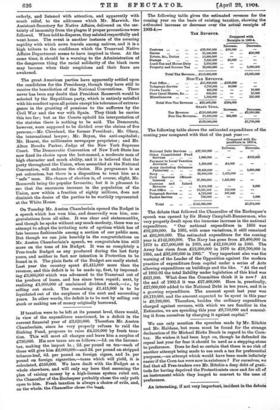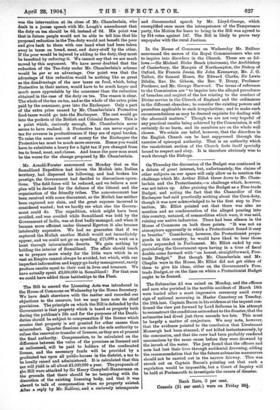was the intervention at its close of Mr. Chamberlain, who
dealt in a jocose speech with Mr. Lough's amendment that the duty on tea should be M. instead of 8d. MB point was that in future people would not be able to tell him that his proposed reduction in the Tea-duty would not benefit the poor and give back to them with one hand what had been taken away in taxes on bread, meat, and dairy-stuff by the other. If the poor would be injured by adding to the duty, they most be benefited by reducing it. We cannot say that we are much moved by this argument. We have never doubted that the reduction of the Tea-duty under Mr. Chamberlain's scheme would be per as an advantage. Our point was that the advantage of this reduction would be nothing like as great as the disadvantage of the new taxes on food, which, being Protective in their nature, would have to be much larger and much more appreciable by the consumer than the reduction Obtained in the case of the duty on tea. The reason is clear. The whole of the tax on tea, and so the whole of the extra price paid by the consumer, goes into the Exchequer. Only a part of the extra price caused by Mr. Chamberlain's Protective food-taxes would go into the Exchequer. The rest would go into the pockets of the British and Colonial farmers. This is a point which, curiously enough, Mr. Chamberlain never seems to have realised. A Protective tax can never equal a tax for revenue in productiveness if they are of equal burden. To raise the same amount of money for the Exchequer the Protective tax must be much more onerous. Hence you would have to substitute a heavy for a light tax if you changed from tea to bread, meat, and cheese. And hence the poor man must be the worse for the change proposed by Mr. Chamberlain.











































 Previous page
Previous page